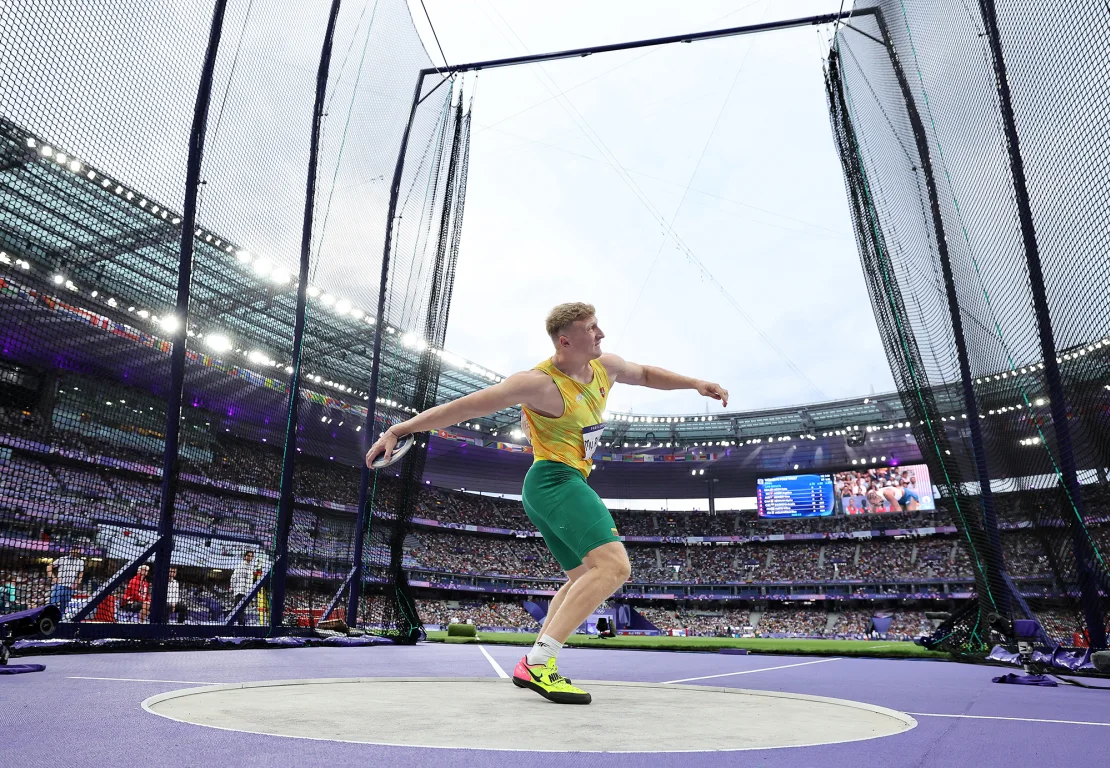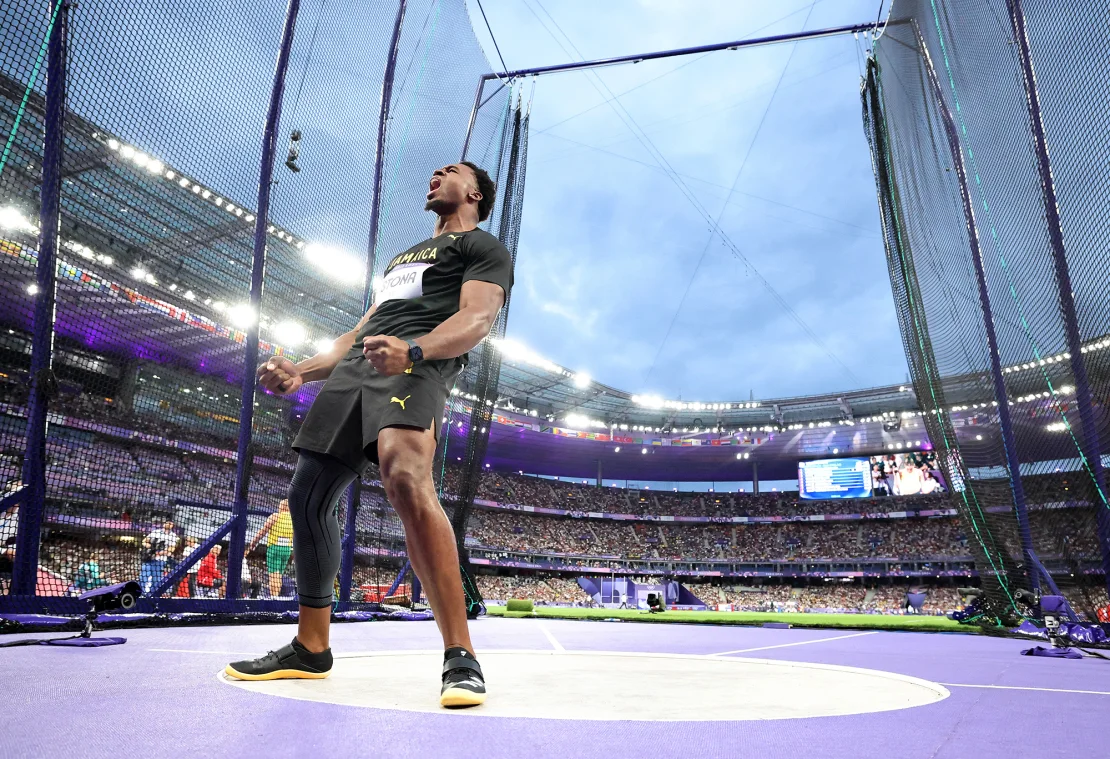The Stade de France witnessed an evening replete with drama and intensity, as four gold medals were contested amidst fierce competition and personal stakes. The night was marked by high-profile rivalries and intriguing familial dynamics.
Here are five key takeaways from this exhilarating night of track and field:
Quincy Hall’s stunning charge in the 400 meters
The 400-meter race at the Olympics was anticipated to be one of the most open contests in years. Based on his effortless performances during the qualifiers, American runner Quincy Hall emerged as a strong favorite before the final.
Competing from lane eight, Hall’s qualifying heats suggested he was a formidable contender for a new world record. While this milestone eluded him, Hall’s remarkable effort in the final secured him the gold medal.
The Stade de France was abuzz with excitement as 80,000 spectators eagerly awaited the first gold medal race of the evening. Hall’s performance was initially understated; he trailed in sixth position as the runners approached the final curve. However, in a dramatic turn of events, Hall surged forward, closing the gap with impressive speed as he entered the final stretch. His face bore the strain of his exertion as he advanced past his competitors.
Reflecting on his strategy, Hall remarked, “I was just thinking, ‘Get home, sir. Get home, sir.’”
In the final moments of the race, Quincy Hall narrowly defeated Great Britain’s Matthew Hudson-Smith by a mere 0.04 seconds. Reflecting on the close contest, Hudson-Smith acknowledged, “When it was too late,” referring to the instant he realized Hall was closing in. He added, “I thought I had it. We knew coming into this that it was going to come down to the last 50 meters. There’s only going to be one winner. He’s a better man. I can’t complain because I ran the fifth-fastest time overall. I always say, if you want to win, you’ve got to take it from me, and he did. I’m going to lower that time. It’s just the start.”
For Hall, the triumph was a significant milestone. He achieved a personal best, briefly leading the race by just a tenth of a second before ultimately securing the gold medal. Zambia’s Muzala Samukonga claimed the bronze.
In celebration, Hall rang the victory bell at the northern end of the Stade de France, removed his shoes, and posed for photographs. With the American flag draped around him, he completed a shoeless victory lap around the track, eliciting enthusiastic cheers from the crowd.
“This victory holds significant meaning for me,” Hall stated. “I have dedicated considerable effort towards this goal. I had previously declared my intention to secure a gold medal this year, and I am pleased to have fulfilled that promise. I have always believed in my ability to win, and today was a testament to that belief. My career has been marked by relentless effort and self-discipline. My coach, with whom I have been in constant communication, has continually encouraged me to persevere.”
“I am characterized by my resilience and determination. I confront challenges with resolve and tenacity. Every strategy I employ is aimed at achieving this goal. The journey has been fraught with pain and difficulty, but I have triumphed. The victory is now secured. For the next four years, I can proudly claim the title of Olympic champion.”
Mykolas Alekna breaks his father’s Olympic record – and still has to settle for silver
Mykolas Alekna of Lithuania, the world’s leading discus thrower and holder of the world record, entered Wednesday’s competition as the clear favorite to secure the gold medal. However, Alekna’s ambitions extended beyond merely winning; he sought to surpass the Olympic record established by his father, Virgilijus Alekna, at the 2004 Athens Games.

On his second throw of the evening, Mykolas Alekna achieved a remarkable feat, propelling the discus to a distance of 69.97 meters. This throw surpassed his father’s Olympic record from Athens by 0.08 meters, positioning Alekna to claim the gold medal, the Olympic record, and familial bragging rights.
However, Alekna’s hopes for a trifecta were dashed moments later. Following his record-setting throw, Rojé Stona of Jamaica entered the circle and delivered an extraordinary 70-meter throw, displacing Alekna to second place in both the competition and the annals of Olympic history.
Stona, who had finished 19th at last year’s World Championships and was ranked 11th in the world, made a dramatic entrance into the Olympic scene, disrupting the anticipated celebration for the Alekna family just outside Paris.

“It’s a very special night,” Rojé Stona remarked. “It’s everything I wanted, and experiencing it firsthand is an incredible feeling.” Stona, reflecting on his preparation, noted, “In practice leading up to the competition, I felt exceptional. I had faith in my abilities, and when the time came, I performed without pressure. I was already among the top eight, so I had nothing to lose.”
He continued, “I accomplished feats I hadn’t previously realized I was capable of. Belief and faith in myself allowed me to be present and fully enjoy the moment.”
Mykolas Alekna made several attempts to reclaim his record and the gold medal, but was unable to surpass Stona’s mark. The final throw was anticipated as his opportunity to secure victory, yet a disappointing effort that struck the netting left him with the silver medal. Despite this setback, Alekna, who will be just 25 at the 2028 Los Angeles Games, is expected to return to the Olympic stage with renewed determination to claim gold.
Aussie tops American in a battle of the world’s best in pole vault
The women’s pole vault final was widely anticipated to be a contest between Nina Kennedy of Australia and Katie Moon of the United States.
As the largest field in the history of the women’s pole vault gradually diminished from twenty competitors to a select few, the top-ranked vaulters demonstrated their exceptional skill by effortlessly clearing the bar. Ultimately, it came down to Kennedy, ranked number one, and Moon, ranked number two.
Kennedy achieved a smooth clearance of the 4.90-meter bar on her first attempt. Moon, however, was unable to clear the height on her initial try. Opting against risking two additional attempts at 4.90 meters, Moon chose to bypass this height and advance directly to 4.95 meters—a decision that would prove to be a critical gamble.
By passing on the 4.90-meter bar, Moon had only two attempts at 4.95 meters rather than the standard three. Both Moon and Kennedy failed their first attempts at 4.95 meters, heightening the suspense.
Moon needed to clear 4.95 meters on her second attempt to force Kennedy to match her height. A failure would result in Moon settling for silver while Kennedy would claim gold.
With the crowd at Stade de France roaring in anticipation, Moon made her run, planted her pole, but ultimately hit the bar. The night belonged to Kennedy.
Kennedy, surrounded by her family in the stands, was overcome with joy and tears of triumph. The world’s top-ranked pole vaulter entered the competition as the favorite but knew the contest would be close, especially after sharing the gold medal with Moon at last year’s World Championships.
“I’ve thought about the Olympic Games every single day since Budapest last year, when Katie and I shared the gold,” Kennedy reflected. “It’s incredible to have so many friends, family, and my team here. We had a job to do tonight, and we accomplished it.”
In the end, this was one of the few disappointments for Team USA on Wednesday night.
Three Americans set for men’s 200-meter race
Earlier in the evening, three semifinal heats in the men’s 200-meter race determined the contenders for the Thursday night final, and Team USA will be well-represented with three American athletes on the starting line.
Noah Lyles, who clinched victory in the men’s 100-meter race on Sunday, advanced to the final with a second-place finish in his semifinal heat. Although this result was surprising given that the 200 meters is Lyles’ specialty, in which he secured a bronze medal in Tokyo, his earlier performance in both qualifying heats for the 100 meters, where he won gold, suggests he remains a formidable competitor. Consequently, the second-place finish in the 200-meter semifinal is unlikely to be a major concern for him.
Americans dominated the remaining two semifinal heats on Wednesday, ensuring strong representation in the final. Erriyon Knighton and Kenneth Bednarek both emerged victorious in their respective races and will join Lyles in the 200-meter final scheduled for 2:30 p.m. ET on Thursday at the Stade de France.
Moroccan charges in the final lap of 3,000m steeplechase to eke out a win over American
Soufiane El Bakkali of Morocco entered the 3,000-meter steeplechase as the world’s top-ranked competitor, and he demonstrated his dominance in the final 200 meters of the race, which concluded the evening’s events at the Stade de France.
Throughout the majority of the race, the lead was held by three Ethiopian runners: Samuel Firewu, Getnet Wale, and Lamecha Girma. However, as the final lap commenced, American Kenneth Rooks made a decisive move. Ranked 49th in the world, Rooks appeared poised to secure an extraordinary upset. The situation seemed to favor him further when Girma stumbled over one of the final barriers, falling to the track and disrupting the rhythm of the leading pack.
Despite the emerging opportunity, El Bakkali proved his resilience and prowess. He accelerated towards the final water obstacle, overtaking Rooks in the home stretch and crossing the finish line 0.36 seconds ahead of the American.
El Bakkali’s victory marks his second gold medal in this event, successfully defending the title he earned in Tokyo. The win appeared even more gratifying as he celebrated with a large group of Moroccan supporters well after the race had concluded and much of the stadium had cleared. In a gesture of triumph, he even took a celebratory dip in the water obstacle that had played a crucial role in his final surge.


